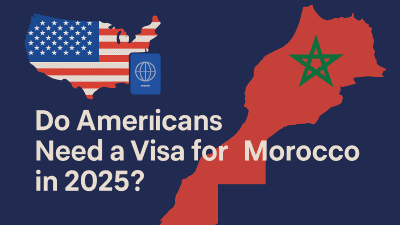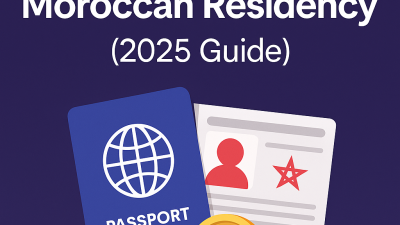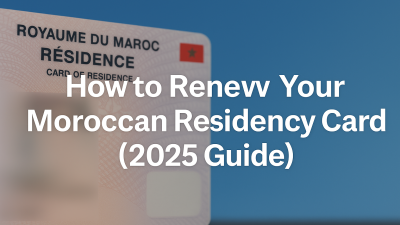So, you’ve fallen in love with Morocco — the colors, the rhythm, the food, the sunsets. And now you’re thinking about turning a short visit into something more permanent. Whether you’re planning to retire under the sun, work remotely from a riad rooftop, or just enjoy a new lifestyle, this guide breaks down how to legally live in Morocco through residency, also known as the Carte de Séjour.
Let’s get right into it.
Who Needs Moroccan Residency?
If you’re not Moroccan and want to stay more than 90 days, you need to apply for residency. This includes citizens from:
- United States
- Canada
- United Kingdom
- European Union countries
These nationalities can enter visa-free for up to 90 days. But once you’re here, that 90-day clock starts ticking.
You’ll need to apply for residency if you want to:
- Stay beyond the 90-day limit
- Rent a long-term apartment
- Open a Moroccan bank account
- Register for utilities, mobile, or internet
What Is the Carte de Séjour?
The Carte de Séjour is Morocco’s official residency card. It’s issued to foreigners who live legally in the country for more than 3 months. It’s valid for one year at first, and renewable.
Once you have it, you can:
- Travel in and out without worry
- Enroll in local services
- Sign legal contracts
- Apply for longer-term residency later
Documents You’ll Need
The requirements can vary slightly by city, but generally you’ll need to gather the following:
| Document | Notes |
|---|---|
| Valid Passport | Must have at least 6 months validity |
| Passport Photos (6-10) | Local style photos, not U.S. size |
| Notarized Rental Contract | Shows you live at a fixed Moroccan address |
| Proof of Income or Savings | Bank statements, pension letter, job contract |
| Health Certificate | From a local Moroccan doctor |
| Police Background Check | From your home country (sometimes waived) |
| Tax Stamp/Form | Get this at the local tax office |
| Application Form | Pick up at the police station (in French) |
Tip: Bring both original documents and multiple photocopies.
Where and How to Apply
You’ll need to apply in person at the Bureau des Étrangers, usually located inside your neighborhood police station.
Steps:
- Collect all your documents
- Get your rental contract notarized
- Get passport photos at a local studio
- Visit the police station and submit everything
- Complete a short interview (in French or Darija)
- Receive a temporary receipt while your card is processed
Processing time: 2 to 8 weeks
Residency card validity: 1 year (renewable)
Costs to Expect
| Item | Approximate Cost (USD) |
| Residency Tax Stamp | $10–$20 |
| Document Translations | $5–$15 per page |
| Passport Photos (10) | $5–$10 |
| Notary Fees for Contract | $10–$30 |
Total Estimated Cost: $30–$80 depending on services and location.
Renewal Process
Residency must be renewed annually. For renewal:
- Submit updated proof of income and address
- Show that you’ve remained in legal standing
- Repeat the police station visit (with fewer documents)
After 3–5 consecutive years of residency, you may be eligible for:
- A longer-term residency card
- Permanent residency (in rare cases)
Common Pitfalls and How to Avoid Them
- Don’t overstay your 90-day entry — apply for residency early
- Have a translator or local friend help if you don’t speak French
- Expect delays — Moroccan bureaucracy works on its own schedule
- Ask expats in your city for up-to-date tips and police station experiences
Final Thoughts
Yes, applying for residency in Morocco can feel a little intimidating at first — new language, unfamiliar offices, lots of paperwork. But once you’ve gone through the process, the freedom it gives you is absolutely worth it.
You’ll be able to stay long-term, avoid immigration stress, and settle into Moroccan life fully — with a bank account, apartment lease, and everything else that makes life easier.
Start early, stay organized, and ask for help when needed. That’s really the best formula.
Once you’ve got your residency card in hand, you’re no longer just a visitor — you’re part of the rhythm of Morocco.
FAQs: Residency in Morocco (2025)
Q1: Can I apply for Moroccan residency before arriving?
No. You must enter the country and apply from within.
Q2: Do I need to speak French or Arabic to apply?
Not fluently, but it helps. Bring a local friend or translator.
Q3: What if I don’t have proof of income?
Some police stations may accept a savings account with enough funds. Others may not. It varies by location.
Q4: Is residency hard to get in Morocco?
Not necessarily. It’s paperwork-heavy, but most expats get approved if they follow the process.
Q5: What happens if I overstay the 90-day limit?
You may be fined, refused residency, or flagged at immigration upon exit or re-entry.
Planning ahead makes all the difference.


